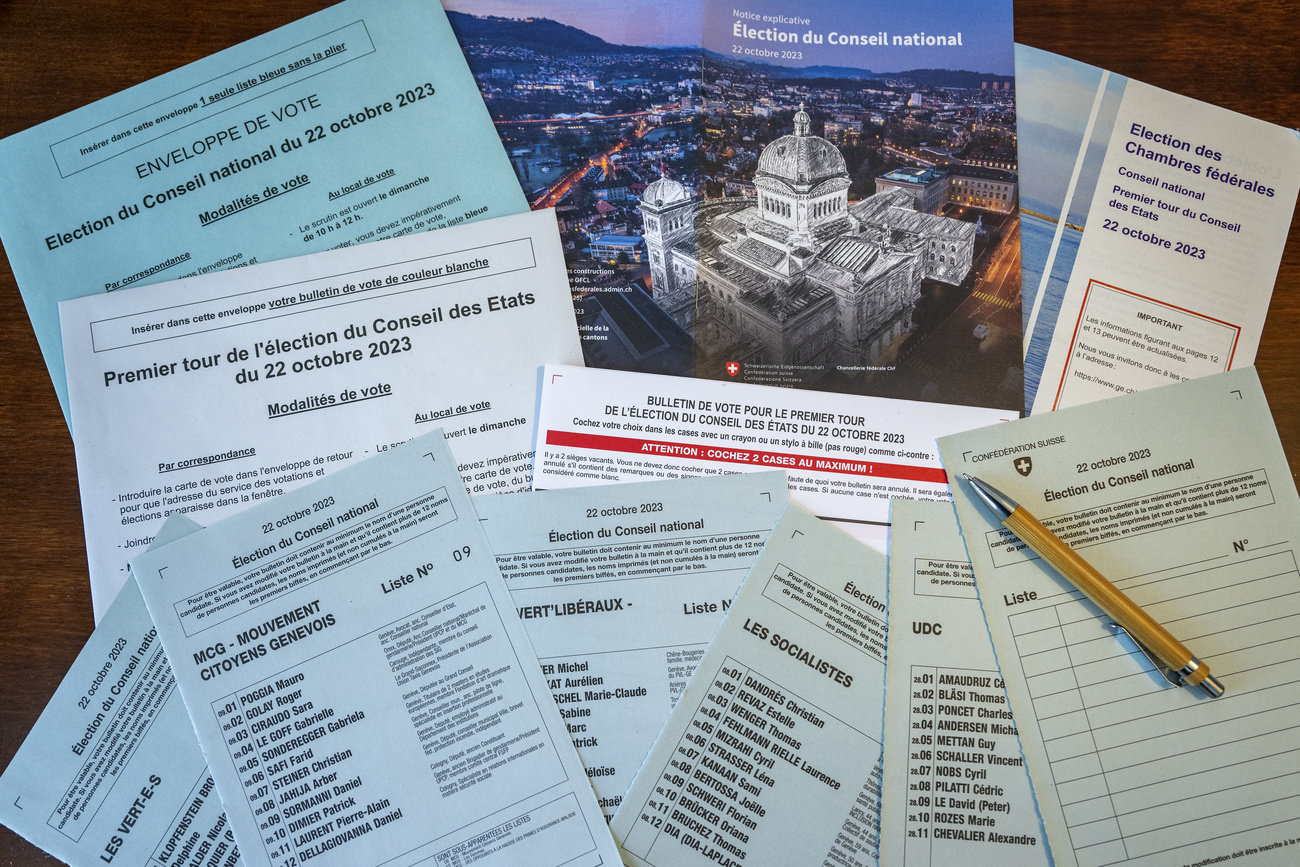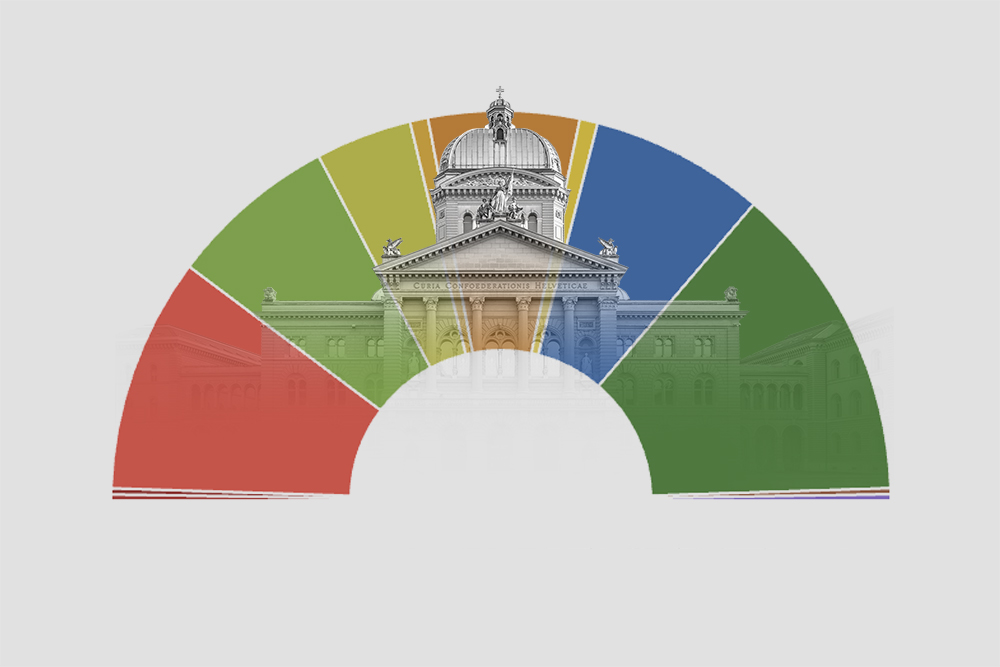Swiss Abroad also turn their back on Greens

As in Switzerland, the green vote in 2023 federal elections dropped among the Swiss diaspora, mainly in favour of the Social Democratic Party. By contrast, the rise in support for the Swiss People’s Party was not reflected in the ballots cast by Swiss voters abroad. No Swiss Abroad was elected to parliament.
One of the main conclusions to be drawn from Sunday’s federal elections is that the green wave that characterised the 2019 legislative elections is a thing of the past. At national level, the two green parties suffered a real slap in the face.
At 9.4%, the Greens’ share of the vote fell by 3.8 percentage points and the party lost five seats. Only the other ecologist party, the Liberal Greens, had a worse result in terms of mandates (losing six seats and recording a 0.6 percentage point drop in electoral share to 7.2%).

More
Elections 2023: results
Swiss living abroad also voted significantly less for the Greens this year. In all 12 cantons that provide separate statistics on the diaspora vote, the Green Party lost 5.4 percentage points in electoral share, dropping from first place in 2019 (with 23.8% of the vote) to third place this year (with 18.4%).
This is despite the fact that the Swiss Abroad traditionally vote more in favour of the climate than their compatriots in Switzerland, as has been the case in recent popular votes on this issue. According to Martina Mousson, a political scientist at gfs.bern, the Green Party’s decline is linked to the current context, both abroad and in Switzerland.
The situation now is fundamentally different from the situation four years ago, she said. “Although the climate remains one of the main concerns of the Swiss, it was clearly not a relevant issue for the elections and was overshadowed by other global themes”, such as the war in Ukraine, the economic situation or inflation, Mousson said. “Switzerland is not the only country concerned.”
Broad support for Social Democrats
At national level, the left-wing Social Democratic Party recorded the second-biggest increase behind the People’s Party (1.2 percentage points to 18% of the vote). Abroad, it made the biggest gains (2.8 percentage points, from 17.6% to 20.4% of the vote).
The main change in the vote of Swiss living abroad in 2023 therefore seems to be a transfer to the Social Democrats of the votes that went to the Greens in 2019.
Does this mean the Greens have lost the confidence of the expatriate population? “I don’t think the Greens have done anything wrong,” Mousson said. “In general, right-wing parties have a better chance of doing well in uncertain global situations.” She believes the ecologists have probably fallen victim to the global economic situation this year, whereas they benefited from it four years ago.
Modest People’s Party progress
On the other hand, in contrast to the national picture, the Swiss People’s Party cannot be said to have triumphed at the ballot box among Swiss expatriates.
The right-wing party, the country’s leading political force, which also saw the strongest growth this year (nine new seats and 28.6% of the vote, up three percentage points), also saw an increase beyond Switzerland’s borders, albeit more moderate: from 18% to 18.5% of the diaspora vote.
The People’s Party remains the second political force among the Swiss Abroad but with scores that are still significantly lower than those achieved at national level.
But the Swiss electorate abroad is traditionally more liberal and left-leaning than the rest of the country. “This is nothing new, which is why I’m not surprised that the People’s Party has not made greater inroads abroad,” Mousson said.
Overall, the way the diaspora voted confirms the tendency of this electorate to lean more to the left and more green than the domestic population. Between them, the main left-wing parties (Social Democrats and Greens) won almost 39% of the vote (compared with 27% for Switzerland as a whole); the combined strength of the ecologist parties (Greens and Liberal Greens) was 30% abroad (compared with 17% in Switzerland).
The scores of the other parties remain relatively stable. The Centre Party gained 0.9 percentage points, a rise close to that achieved at national level (0.8 percentage points). For the Radical-Liberal Party, too, the trend is much the same among the Swiss Abroad as for voters in Switzerland: the centre-right party is down 0.6 percentage points (compared with 0.7 for the country as a whole).
As is often the case, voter turnout among the Swiss Abroad remained low, at 18.7% (compared with 46.6% nationally), and was down in virtually all cantons with the exception of Basel City and St Gallen.
In a press release issued on October 24, the Organisation of the Swiss Abroad (OSA) noted that these were two of the three cantons (the third being Thurgau) that were able to elect their representatives to parliament electronically for the first time this year.
The OSA, which advocates e-voting for the Swiss Abroad, sees this as confirmation that it will help to increase voter turnout among the Swiss Abroad.
No Swiss Abroad elected
Forty-three Swiss nationals from abroad stood for election in these federal elections. Unsurprisingly, none of these candidates made the grade. Nevertheless, the results of two members of the diaspora stood out.
The candidate from abroad who received the most votes was Pascal Cuttat, from Nairobi in Kenya, who stood in canton Bern. No fewer than 12,451 Bernese voted for the 61-year-old Social Democrat, who works for the Swiss Red Cross.
In Geneva, Green politician Rudolf Berli notched up an impressive 11,947 votes to come fourth on the party’s list. The market gardener from Pougny (France) received 4,271 votes in Geneva alone and 999 votes from abroad.
The most recent election of a parliamentarian from abroad was that of Tim Guldimann for the Social Democrats in canton Zurich. He achieved a brilliant result in 2015, winning 102,757 votes. At the time, he was not the first Swiss Abroad to sit in parliament, but the first to be elected while living abroad. Guldimann resigned in 2018, arguing that it was difficult to “live in one environment and do politics in another”.
In practice, the Swiss Abroad have hardly any chance of being elected, Ariane Rustichelli, director of the OSA, confirms. “The Guldimann case was quite exceptional,” she said.
The demand that the Swiss Abroad have direct representation in parliament is raised again and again, she added. “The OSA has a working group that supports this,” Rustichelli said. However, because there would have to be a constitutional amendment for this, this demand has not yet been successful, she said.
On October 25 this article was amended to include the OSA’s analysis of the increase in voter turnout thanks to electronic voting.
Translated from French by Thomas Stephens

In compliance with the JTI standards
More: SWI swissinfo.ch certified by the Journalism Trust Initiative






You can find an overview of ongoing debates with our journalists here. Please join us!
If you want to start a conversation about a topic raised in this article or want to report factual errors, email us at english@swissinfo.ch.